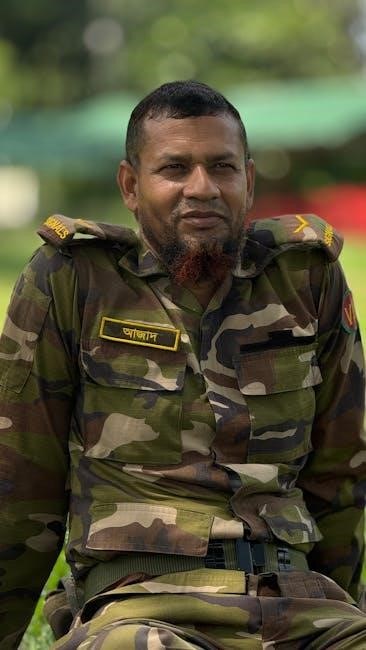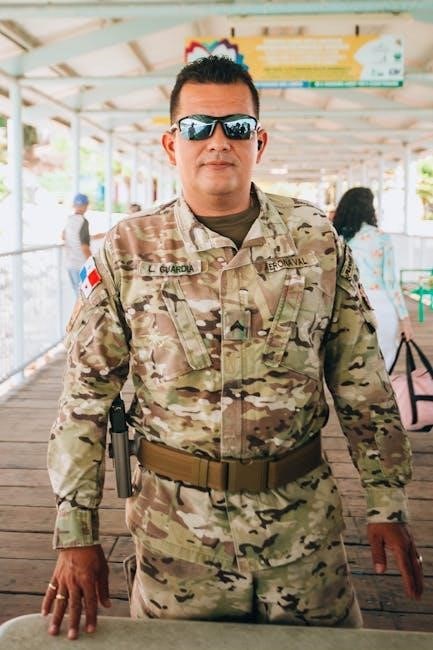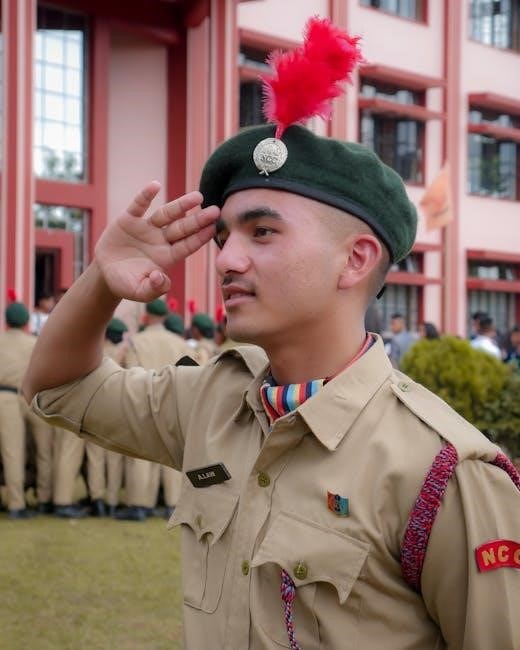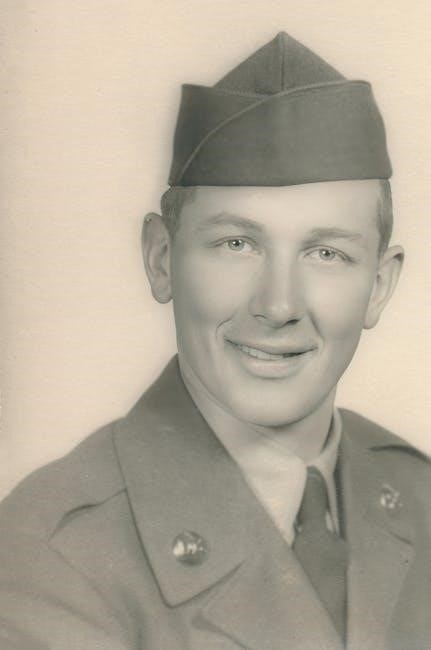army noncommissioned officer guide
The Army Noncommissioned Officer Guide provides essential insights into the roles, responsibilities, and professional development of NCOs, highlighting their critical role in leadership, training, and mentorship within the Army.
1.1. Purpose of the Guide
The Army Noncommissioned Officer Guide serves as a comprehensive resource for NCOs, outlining their roles, responsibilities, and professional development opportunities. Its primary purpose is to equip NCOs with the knowledge and skills necessary to lead effectively, mentor subordinates, and contribute to mission success. The guide emphasizes leadership principles, ethical standards, and operational readiness, ensuring NCOs are prepared to address modern military challenges. It also provides guidance on career advancement, education, and continuous improvement, fostering a culture of professionalism and excellence within the Army. By adhering to the guide, NCOs can enhance their performance and contribute to the overall effectiveness of their units.
1.2. Scope of the Guide
The Army Noncommissioned Officer Guide covers a wide range of topics essential for NCOs, including leadership principles, training methods, mentorship techniques, and career management. It provides detailed guidance on operational responsibilities, ethical standards, and professional development opportunities. The guide also addresses the Noncommissioned Officer Education System (NCOES), outlining structured courses like the Advanced Leaders Course (ALC) and Senior Leaders Course (SLC). Additionally, it emphasizes the importance of continuous improvement, readiness, and adherence to Army regulations. The scope ensures NCOs are well-prepared to lead, train, and inspire soldiers while maintaining high levels of professionalism and integrity. This comprehensive resource supports NCOs in achieving their full potential within the Army.
1.3. Target Audience
The Army Noncommissioned Officer Guide is primarily designed for active-duty NCOs, focusing on their roles, responsibilities, and professional growth. It also serves as a valuable resource for junior soldiers aspiring to become NCOs, providing insights into leadership expectations and career pathways. Additionally, the guide is beneficial for officers and military personnel who work closely with NCOs, helping them understand the critical role NCOs play in unit leadership and operations. The content is tailored to enhance leadership, mentorship, and decision-making skills, ensuring alignment with Army standards and values. By addressing the needs of both current and future NCOs, the guide supports the development of a competent and effective noncommissioned officer corps.

Role and Responsibilities of Noncommissioned Officers
NCOs serve as leaders, mentors, and experts, ensuring unit readiness, enforcing standards, and guiding soldiers. They are pivotal in executing missions and upholding Army traditions;
2.1. Leadership and Mentorship
Noncommissioned officers are the backbone of the Army, providing leadership and mentorship to soldiers at all levels. They foster growth, accountability, and professionalism, ensuring soldiers meet high standards. NCOs lead by example, demonstrating integrity and expertise. Mentorship is a cornerstone of their role, helping soldiers navigate their careers and develop critical skills. Effective NCOs create a positive learning environment, encouraging soldiers to think critically and take initiative. Their leadership ensures unit cohesion and mission readiness, while their mentorship builds the next generation of Army leaders. By balancing firmness with approachability, NCOs inspire loyalty and drive their teams to achieve excellence in every endeavor.
2.2. Training and Development
The Army Noncommissioned Officer Guide emphasizes the importance of continuous training and development for NCOs. The Noncommissioned Officer Education System (NCOES) provides structured courses such as the Advanced Leaders Course (ALC), Senior Leaders Course (SLC), and Master Leaders Course (MLC). These programs focus on enhancing leadership, tactical, and technical skills, ensuring NCOs are prepared for evolving challenges. Training also includes specialized schools and certifications, fostering expertise in specific military occupations. NCOs are encouraged to pursue lifelong learning, refining their abilities through mentorship, self-study, and practical experience. This comprehensive approach ensures NCOs remain proficient, adaptable, and capable of leading soldiers effectively in diverse operational environments.
2.3. Operational Responsibilities
NCOs play a pivotal role in executing missions and ensuring operational success. They are responsible for planning, coordinating, and supervising tasks, ensuring efficiency and safety. NCOs manage resources, oversee unit operations, and enforce standards to maintain discipline and readiness. They conduct inspections, assess performance, and provide feedback to improve effectiveness. Additionally, NCOs are accountable for maintaining unit cohesion, fostering a positive environment, and addressing challenges that impact mission accomplishment. Their operational expertise and leadership are essential in achieving strategic goals, making them indispensable in both garrison and combat settings. NCOs ensure that all operations align with Army doctrine and contribute to the overall success of military objectives.
2.4. Ethical and Professional Standards
NCOs are expected to uphold the highest ethical and professional standards, serving as role models for junior soldiers. They must adhere to the Army Values of loyalty, duty, respect, selfless service, honor, integrity, and personal courage. Ethical decision-making is critical, as NCOs often face complex situations requiring sound judgment. Professional standards include maintaining discipline, accountability, and respect for authority. NCOs must avoid unethical behavior, such as favoritism or misconduct, which can undermine unit cohesion and trust. Their actions and demeanor set the tone for the entire unit, influencing morale and mission success. Upholding these standards ensures the NCO corps remains a pillar of integrity and professionalism within the Army.

History and Evolution of Noncommissioned Officers
The history of NCOs traces back to the Revolutionary War, evolving over centuries to reflect changing military needs and organizational structures, shaping their vital role today.
3.1. Historical Context
The role of Noncommissioned Officers (NCOs) in the U.S. Army traces its roots to the Revolutionary War, where NCOs were first recognized for their leadership in maintaining discipline and executing commands. Over centuries, the NCO Corps evolved, with significant developments during the Civil War and World Wars I and II, where their responsibilities expanded to include training, tactics, and operational leadership; The formalization of the NCO Education System in the 20th century further solidified their role as the backbone of the Army, ensuring continuity and professionalism. The historical context underscores the adaptability and enduring importance of NCOs in military operations and leadership.
3.2. Key Milestones in NCO Development
The development of the Noncommissioned Officer (NCO) Corps has been marked by significant milestones that shaped its role and professionalism. The Revolutionary War established the first formal NCO ranks, while the Civil War expanded their responsibilities. In 1778, the Continental Congress formalized NCO ranks, creating the foundation for modern NCO leadership. The 20th century saw the establishment of the Noncommissioned Officer Education System (NCOES) in 1964, standardizing training. The 1980s introduced leadership doctrine updates, emphasizing NCOs as the “backbone of the Army.” In 2009, the Army published doctrine FM 7-22.2, expanding NCO roles in training and mentoring. The 2014 NCO Professional Development System and the 2019 Army Doctrine Publication 7-22 further refined NCO responsibilities, solidifying their critical role in Army operations.
3.3. Notable NCOs in Military History
Throughout military history, Noncommissioned Officers (NCOs) have played pivotal roles in shaping victories and inspiring troops. Figures like Audie Murphy, a decorated World War II hero, exemplified NCO leadership by earning numerous medals, including the Medal of Honor. Samuel Woodfill, a World War I sergeant, demonstrated extraordinary bravery in combat, earning the Medal of Honor for his actions. The Sergeant Major of the Army position, established in 1966, highlights NCOs’ strategic influence. These individuals set standards for professionalism, courage, and mentorship, leaving a lasting legacy that continues to inspire modern NCOs. Their contributions underscore the critical role of NCOs in military success and leadership development.

Noncommissioned Officer Education System (NCOES)
NCOES is a structured framework enhancing professional and personal growth, equipping NCOs with essential skills and knowledge to lead effectively in diverse military environments.
4;1. Structure of NCOES
The Noncommissioned Officer Education System (NCOES) is structured to progressively develop leadership and technical skills through tiered courses. It begins with the Advanced Leaders Course (ALC), focusing on small-unit leadership and tactical operations. The Senior Leaders Course (SLC) builds on this foundation, emphasizing advanced leadership, operational planning, and strategic thinking. The Master Leaders Course (MLC) culminates the education system, preparing senior NCOs for brigade-level responsibilities and complex operational challenges. Each course is designed to align with the NCO’s career progression, ensuring they are equipped to lead effectively at every stage. This structured approach ensures NCOs are prepared to meet the Army’s evolving needs and operational demands.
4.2. Advanced Leaders Course (ALC)
The Advanced Leaders Course (ALC) serves as the foundation of the Noncommissioned Officer Education System (NCOES), targeting Sergeants and Staff Sergeants. It focuses on developing leadership, tactical, and technical skills necessary for small-unit leadership. The course emphasizes decision-making, problem-solving, and communication, preparing NCOs to lead effectively at the squad and platoon levels. ALC integrates classroom instruction with practical exercises, ensuring NCOs can apply their knowledge in real-world scenarios. This training is critical for NCOs transitioning into higher levels of responsibility, equipping them with the expertise to mentor subordinates and execute mission objectives efficiently. The ALC is a cornerstone for building competent and confident leaders within the Army.
4.3. Senior Leaders Course (SLC)
The Senior Leaders Course (SLC) is an advanced component of the Noncommissioned Officer Education System (NCOES), tailored for Sergeants First Class and Master Sergeants. It focuses on developing strategic leadership, operational planning, and decision-making skills essential for higher-level command. The course prepares NCOs to lead at the battalion and brigade levels, emphasizing critical thinking, problem-solving, and effective communication. SLC integrates theoretical knowledge with practical applications, ensuring NCOs can address complex challenges in dynamic environments. This training equips senior leaders with the expertise to mentor junior NCOs, execute large-scale operations, and contribute to organizational success. The SLC is vital for fostering competent and visionary leaders capable of driving mission accomplishment.
4.4. Master Leaders Course (MLC)
The Master Leaders Course (MLC) is the capstone of the Noncommissioned Officer Education System, designed for senior NCOs such as Sergeants Major and Command Sergeants Major. It focuses on advanced leadership, strategic planning, and operational execution at the brigade and division levels. The course emphasizes developing visionary leaders capable of shaping organizational culture and guiding large-scale operations. MLC curriculum includes strategic decision-making, joint operations, and global military issues, preparing NCOs to advise senior commanders and lead complex missions. This course is critical for equipping top-tier NCOs with the skills to address modern military challenges effectively and maintain the Army’s operational excellence.

Career Management for NCOs
Career management for NCOs involves strategic planning, assignments, education, and mentorship to maximize potential and ensure alignment with Army needs and individual career goals effectively.
5.1. Promotion Process
The promotion process for NCOs is a structured system designed to identify and advance qualified leaders. It evaluates performance, education, and leadership potential, ensuring the Army selects the best candidates. Promotion boards review soldier records, considering factors like merit, seniority, and training accomplishments. The process emphasizes fairness, transparency, and adherence to Army standards. NCOs must meet specific criteria, such as completing required courses and demonstrating leadership capabilities. Promotions are competitive, with selections based on individual and unit needs. Mentorship and professional development play a critical role in preparing NCOs for higher ranks. The process is governed by Army regulations, ensuring consistency and excellence in leadership advancement.
5.2. Assignment and Duty Positions
NCOs are assigned to duty positions based on the Army’s needs, their skills, and career progression. Assignments can vary from tactical roles in combat units to training positions in educational institutions; NCOs may serve as squad or platoon sergeants, instructors, or recruiters, depending on their expertise. Duty positions often require adaptability, as NCOs may be deployed to various locations, including overseas. The Army considers individual strengths and unit requirements to ensure optimal placement. These assignments are crucial for developing leadership skills and preparing NCOs for broader responsibilities. Duty positions also provide opportunities for specialization, enabling NCOs to contribute effectively to mission success and organizational goals.
5.3. Professional Development Opportunities
NCOs have access to various professional development opportunities to enhance their skills and career growth. The Noncommissioned Officer Education System (NCOES) offers structured courses like the Advanced Leaders Course (ALC), Senior Leaders Course (SLC), and Master Leaders Course (MLC), which focus on leadership, tactical expertise, and strategic thinking. Additionally, mentorship programs pair NCOs with experienced leaders to guide their professional journey. Specialized schools, such as the Drill Sergeant Academy, provide advanced training in specific areas. These opportunities ensure NCOs are well-prepared to lead effectively, adapt to new challenges, and contribute to the Army’s mission. Continuous learning and development are essential for maintaining the high standards expected of NCOs.
5.4. Retirement and Transition
Retirement and transition planning are crucial for NCOs nearing the end of their military service. The Army provides resources to ensure a smooth transition to civilian life, including Transition Assistance Programs (TAP) and retirement counseling. These programs offer guidance on education, employment, and healthcare benefits. NCOs are encouraged to start planning early, leveraging tools like the Department of Defense’s Transition Assistance Program. Retirement seminars and workshops are also available to help NCOs understand their benefits and prepare financially. The Army’s commitment to supporting NCOs extends beyond active duty, ensuring they are equipped for success in their post-military careers. Proper planning ensures a seamless transition and honors their dedicated service.

Leadership Principles and Techniques
This section explores foundational leadership principles and practical techniques essential for NCOs, emphasizing communication, decision-making, and team building to foster effective unit leadership and cohesion.
6.1. Core Leadership Competencies
Core leadership competencies are the essential skills and qualities that define effective NCOs. These include strong communication, decision-making, and problem-solving abilities. Leaders must demonstrate adaptability, resilience, and emotional intelligence to inspire and guide their teams. They should foster trust, accountability, and a shared sense of purpose. Critical thinking and ethical decision-making are paramount, ensuring actions align with Army values. NCOs must also cultivate a growth mindset, embracing continuous learning and self-improvement. These competencies enable leaders to navigate complex situations, empower subordinates, and achieve mission success. By mastering these foundational skills, NCOs set the standard for professionalism and excellence within their units.
6.2. Communication and Interpersonal Skills
Effective communication and interpersonal skills are vital for NCOs to lead, inspire, and collaborate within their units. Clear and concise messaging ensures understanding and alignment with mission objectives. Active listening, empathy, and emotional intelligence foster trust and strong relationships. NCOs must adapt their communication style to diverse audiences, addressing individual needs while maintaining professionalism. Conflict resolution and negotiation skills are essential for maintaining cohesion and resolving disputes. Emotional intelligence helps leaders understand and manage their own emotions, as well as those of their team members. Non-verbal cues, such as body language and tone, also play a critical role in conveying authority and approachability. These skills are foundational to building a positive and productive command climate.
6.3. Decision-Making and Problem-Solving
Effective decision-making and problem-solving are critical competencies for NCOs, enabling them to address challenges efficiently and make sound judgments under pressure. NCOs must employ critical thinking, analyzing situations, identifying root causes, and evaluating potential solutions. The Army’s problem-solving model provides a structured approach, ensuring decisions align with mission objectives and organizational goals. Collaboration with the team is essential, leveraging diverse perspectives to enhance outcomes. NCOs should remain adaptable, adjusting plans as situations evolve. Clear communication of decisions and rationale builds trust and ensures successful execution. Proficiency in decision-making and problem-solving is vital for maintaining operational readiness and achieving strategic success.
6.4. Team Building and Collaboration
Team building and collaboration are essential for fostering unity and shared responsibility within Army units. NCOs play a pivotal role in creating a positive environment that encourages open communication, mutual respect, and trust among team members. By promoting collaboration, NCOs ensure that diverse skills and perspectives are leveraged to achieve common goals. Effective team building involves empowering individuals, aligning team efforts with organizational objectives, and fostering a culture of continuous improvement. NCOs also facilitate conflict resolution and encourage active participation in decision-making processes. Strong collaboration enhances mission readiness and ensures that units operate cohesively, ultimately strengthening the Army’s overall effectiveness and success in various operations.

Training and Readiness
Training and readiness are critical for ensuring NCOs and their teams are prepared for mission success, emphasizing continuous improvement and adaptability in dynamic operational environments.
7.1. Individual Training Requirements
Individual training requirements for NCOs focus on developing leadership, technical, and tactical skills to ensure readiness. NCOs must complete advanced courses like the Advanced Leaders Course (ALC), Senior Leaders Course (SLC), and Master Leaders Course (MLC) to enhance their expertise. These programs emphasize critical thinking, problem-solving, and adaptability. Additionally, NCOs are expected to maintain physical fitness standards and stay proficient in their military occupational specialty (MOS). Continuous learning through online platforms and unit-level training ensures they remain up-to-date with evolving doctrines and technologies. Meeting these requirements ensures NCOs are prepared to lead effectively and contribute to mission success.
7.2. Unit Training and Readiness
Unit training and readiness are critical components of an NCO’s responsibilities, ensuring the team is prepared to execute missions effectively. NCOs lead collective training exercises, focusing on tactical drills, combat simulations, and mission-specific tasks. They conduct regular inspections and assessments to evaluate unit proficiency and identify areas for improvement. Readiness involves maintaining equipment, supplies, and personnel at optimal levels. NCOs also ensure compliance with safety protocols and operational standards. Continuous training fosters unit cohesion and adaptability, enabling soldiers to respond decisively in dynamic environments. By prioritizing unit training and readiness, NCOs ensure their teams are capable of achieving mission success under any conditions.
7.3. Combat and Tactical Training
Combat and tactical training are essential for preparing soldiers to operate effectively in high-stress environments. NCOs lead rigorous drills, simulations, and live exercises to hone skills in weaponry, tactics, and mission execution. This training emphasizes adaptability, quick decision-making, and teamwork under fire. Soldiers learn to navigate complex terrain, utilize cover, and coordinate maneuvers seamlessly. NCOs ensure that training reflects real-world scenarios, incorporating lessons from recent operations. Continuous refinement of combat skills ensures readiness for evolving threats. Tactical training also includes counterterrorism, urban warfare, and asymmetric conflict strategies. By mastering these skills, soldiers build confidence and proficiency, enabling them to execute missions successfully in any combat zone.
7.4. Continuous Improvement and Evaluation
Continuous improvement and evaluation are crucial for maintaining high standards of readiness and effectiveness within Army units. NCOs play a key role in assessing training outcomes, identifying areas for growth, and implementing corrective actions. Regular evaluations, such as after-action reviews (AARs), help pinpoint strengths and weaknesses, ensuring lessons learned are incorporated into future training cycles. Feedback from soldiers and peers is vital, enabling NCOs to refine their leadership and instructional techniques. This iterative process fosters a culture of excellence, ensuring units remain adaptable and prepared for evolving challenges. By prioritizing continuous improvement, NCOs contribute to the overall readiness and success of the Army.
Appendices and References
The appendices provide a glossary of key terms, references to critical publications, and contact information for additional support. These resources ensure NCOs have access to essential materials for professional development and guidance.
8.1. Glossary of Terms
The glossary section provides clear definitions for key terms, acronyms, and concepts relevant to the roles and responsibilities of noncommissioned officers. This resource ensures that NCOs and readers understand the specific terminology used throughout the guide. Definitions are concise and aligned with official Army regulations and doctrine. The glossary covers terms related to leadership, training, operations, and professional development, making it an essential reference for both new and experienced NCOs. By standardizing language, it promotes consistency in communication and understanding across all levels of the Army. This section is particularly useful for quick clarification of unfamiliar terms encountered in the guide.
8.2. Key Resources and Publications
This section provides a comprehensive list of essential resources and publications that support the professional development and responsibilities of noncommissioned officers. It includes official Army regulations, such as DA Pam 600-25, which outlines NCO professional development, as well as leadership manuals and training guides. Additionally, it references key documents like the NCO Creed and the Army Leadership Requirements Model. The section also highlights recommended reading materials, including historical accounts of notable NCOs and contemporary leadership studies. These resources are designed to enhance NCOs’ understanding of their roles and responsibilities, ensuring they are well-equipped to lead effectively. Links to digital versions of these publications are also provided for easy access.
8.3. Contact Information for Support
For additional guidance or assistance, NCOs and users of this guide can reach out to various support channels. The Army Human Resources Command (HRC) provides support for career development and policy inquiries at www.hrc.army.mil. The NCO Leadership Center of Excellence can be contacted for professional development resources. Local garrison or unit headquarters also offer support through their G-1 or training offices. For general inquiries, contact the Army Service Center at (555) 123-4567 or via email at army.support@example.com. These resources ensure NCOs have access to the help they need to excel in their roles and responsibilities.
